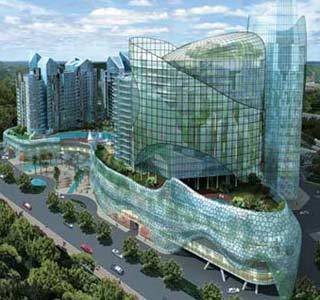VinaCapital eyes revised Times Square design

Despite a prime location opposite the National Convention and Exhibition Centre in western Hanoi, often considered as the city’s future main business district, red tape and re-design issues have delayed the construction of the project since 2008.
The $50 million project – in which VinaCapital holds a 65 per cent share, comprises a shopping centre, 24-storey office building, a 240 room hotel and serviced apartment building, and three 54 to 58 storey residential towers totalling over 1,900 apartments.
But after ground was broken on the project in May 2008, work on the four hectare site in My Dinh urban township ground to a halt.
“Licensing delays coupled with a slow property market have pushed back commencement and a new strategy is now in place,” the company announced in its quarterly report released at the end of 2013.
“The strategy is to secure a long-term commitment from an international retail mall operator and seek to divest all or part of this land parcel to facilitate an early exit,” it claimed as reasons for the long delays.
“Obtaining new licences and revising the master plans have been a challenge, which has led to delays. Due to recent changes in the master planning for the area surrounding Times Square, a revised master plan is being sought with a target completion date in 2014,” the company said.
A Ministry of Construction circular issued in July 2009 amended master planning considerations in the area around the National Convention and Exhibition Centre.
Circular 29/2009/TT-BXD further detailed the scale, height limitations and functions of a number of projects in the area, including Times Square Hanoi.
This compelled VinaLand to make changes in the design, and meant a new construction licence needed to be obtained from the Hanoi Construction Department.
Times Square Hanoi is VinaCapital’s only development in the north and was listed among the company’s top 10 investments, behind projects like Century 21, Danang Beach Resort, Pavilion Square, Dai Phuoc Lotus and VinaSquare.
VinaLand was now in a cash return period and would not make any investments, except where funds are required for existing projects.
VinaLand sold 100 residential units last year, triple its 2012 results, mainly due to improved sales during the fourth quarter.
What the stars mean:
★ Poor ★ ★ Promising ★★★ Good ★★★★ Very good ★★★★★ Exceptional
Latest News
More News
- An Phat 5 Industrial Park targets ESG-driven investors in Hai Phong (January 26, 2026 | 08:30)
- Decree opens incentives for green urban development (January 24, 2026 | 11:18)
- Public investment is reshaping real estate’s role in Vietnam (January 21, 2026 | 10:04)
- Ho Chi Minh City seeks investor to revive Binh Quoi–Thanh Da project (January 19, 2026 | 11:58)
- Sun Group launches construction of Rach Chiec sports complex (January 16, 2026 | 16:17)
- CEO Group breaks ground on first industrial park in Haiphong Free Trade Zone (January 15, 2026 | 15:47)
- BRIGHTPARK Entertainment Complex opens in Ninh Binh (January 12, 2026 | 14:27)
- Ho Chi Minh City's industrial parks top $5.3 billion investment in 2025 (January 06, 2026 | 08:38)
- Why Vietnam must build a global strategy for its construction industry (December 31, 2025 | 18:57)
- Housing operations must be effective (December 29, 2025 | 10:00)
















 Mobile Version
Mobile Version